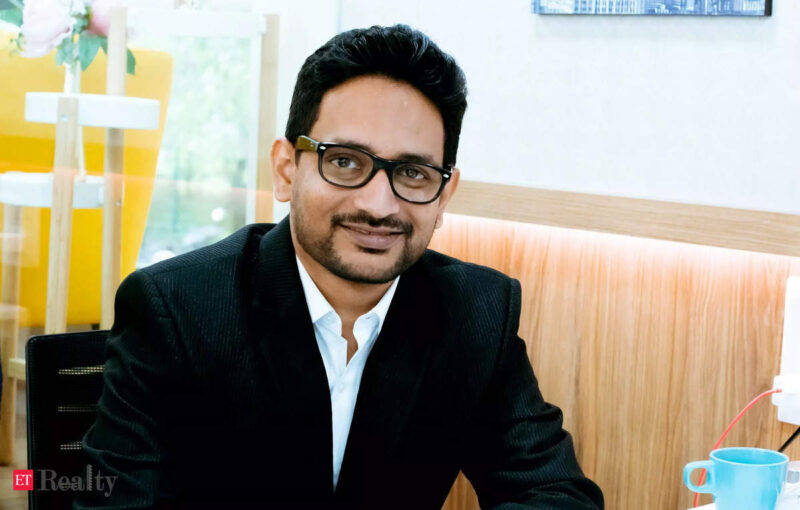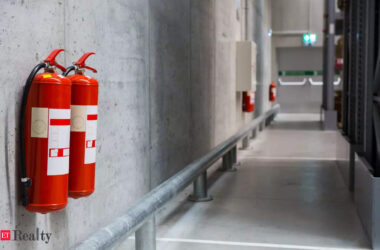NEW DELHI: Shesh Rao Paplikar, founder & CEO of BHIVE Workspace, has seen various ups and downs in his nearly decade long journey. He has created growth for the company and its employees, wealth for his investors & partners, quality spaces for his tenants and at the same time made some mistakes too, which according to him took the company to where it is today.In a tell-all conversation with ETRealty, Paplikar dived into the initial years of the company, its expansion into different verticals and future plans.Initial yearsPaplikar is a first generation entrepreneur. His parents were school teachers. “I am from a tech background, so, whatever I have learned has been along my journey. There was no one to teach me, I mean there were people around me always, but not anyone as a guru.”The very first center he started was for his personal use. “I had just moved from America and the coworking concept was still very new to India. So I decided to lease a space and sub-lease the rest of the area to other entrepreneurs. The concept took off. I suddenly got a lot of queries and hence opened another space. With the response I received, I realized there was an opportunity here ready to be captured.”BHIVE Workspace was founded in November 2014 by Paplikar and Ravindra M.K. as co-founders. Monnappa Bayavanda joined in 2016 as chief operating officer and later became a co-founder. In 2018, Ravindra left the company to join Shriram Properties but joined it back as founding member in 2020.The company raised about $1 million in a funding round led by Blume Ventures in May 2016. At the time, it was operating in four locations covering 50,000 sq. ft. In 2017, it raised another $1.2 million (around Rs 7.7 crore) in a funding round led by Blume Ventures.Within three years of its set up, the company saw its first controversy. In 2017, Paplikar wrote a blog on how a large venture capital fund had revoked its funding offer after signing the term sheet with BHIVE. While Paplikar didn’t name it at the time, the fund according to the sources was Kalaari Capital. The VC firm withdrew its offer in the middle of the due diligence process. BHIVE had to then pay its staff from the personal debt raised from banks by its founders. Karthik Reddy, co-founder and MD of Blume Ventures had at the time criticized Paplikar for making the issue public.”It was one of the lowest times for me personally but when we made it through that, I came out stronger, learned from it and realized we can sail through anything.”Just before covid, the company in conversation with ETRealty had said that they are also looking to become a facility management provider. The idea was eventually dropped. “With facility management, not only the profit margins were less, plus you also had no role in the decision making on running the center,” says Paplikar.Current statusToday, BHIVE Workspace is operating 1.5 million sq ft space across 25 locations in Bengaluru having over 42,000 seats. Out of this, 23 centers are operational and two centers with 25,000 sq ft and 28,000 sq ft spaces are about to be launched in MG Road. One of these two centers was previously a hotel and the company took over in November 2023.In FY20, the company registered Rs 20 crore revenue, which dipped to Rs 10 crore in FY21 but it was still EBITDA positive. In FY22, it did Rs 10 crore revenue as well and was profitable. In FY23, the company recorded Rs 104 crore revenue and EBITDA was around Rs 5 crore. “We expect to touch Rs 210-200 crore revenue and EBITDA of about Rs 25 crore in FY24. For the next 2-3 years we will be growing at the rate of 50 per cent per annum and eventually we may end up at 35-40 per cent growth per annum, which honestly can still take us to significantly big size. In the long run, it’s important to build business models that are more resilient to recession and other factors.”Currently, the company holds about Rs 25 crore of debt mostly from a marquee bank.Its rent across all the centers varies from Rs 6,000 per seat per month to Rs 15,000 per seat per month. At a center level, they have a 35-40 per cent profit margin. The company prefers to lease properties which are available in the range of Rs 40-120 per sq ft.“Churn rate is inversely proportional to the lock-ins we achieve. Rather than churn rate, we actually track renewal rates. About 75% of our contracts get renewed.”As for what is the average occupancy rate that the company maintains across properties, Paplikar says, any given property has an initial timeline, which is required for it to become mature. We believe when a property starts touching over 75% occupancy, we start calling it a mature property.There’s always a lag from the time of signing up to when you go operational. And large properties we prefer to finish in phases.So, for small properties they tend to touch 80-85% occupancy in 6-8 months and for the larger spaces, it takes about 1-1.5 years to touch similar numbers.Acqui-hiring PraemenioThe company recently acqui-hired a technology platform Praemenio and will absorb a 10-member team along with co-founders to strengthen and streamline its operations. This move is to ensure efficient management of their various business activities. “When we were at 1.5 lakh sq ft, honestly, we could somehow run it without much tech. But now at the current scale that we have achieved, we had a realization that we have to invest very heavily on both tech technology processes, training, among others. In order to digest our own growth, we have to make the foundations stronger and put in better processes. Building a team can take a very long time and hence acqui-hiring an existing team that already knows what they are doing makes more sense.””One time opportunity”According to him, the company has grown way more post pandemic and especially in the last one year or few quarters. There was a little bit of stress for a while during the pandemic, but we were able to pull through, since we didn’t have too much debt. Our revenue dropped but our operating cost also dipped. This is when we also realized, fundamentally, that we can survive without injecting a single rupee of equity. What also happened was that various marquee assets were suddenly available for rent at much better prices and we started signing up. Before the pandemic, it was more of a landlord dictated market while during pandemic, we were able to negotiate better.In fact from August 2021, we picked up several good quality assets. We were around 1.5 lakh sq ft before the pandemic and today we are ten times bigger than that. We have grown from 4,000 seats to 42,000 seats.We knew this was a one time growth opportunity and we capitalized the most of it.For a business like co-working, I think the biggest cost one has to understand is actually the rent. There was a time when we felt that good properties are available at good prices, that’s probably when one can go aggressive. Of course, one has to have the right intuition as well.But now for the next few months, the company is more cautious in signing up new assets. Because it is only present in Bengaluru and the kind of customer base that they deal with, Paplikar says that they do get impacted by the US economy.He however adds that even though they are slow in signing up new properties, they still have enough work for the next couple of months from the existing signed up inventory. “So, for the next six months, I don’t have to sign-up any new places as well.”Pragmatic approach“From the current 1.5 million sq ft, do I want to be at 15 million sq ft, in the next two years? To be very honest, I don’t think I would want to take such a path. I think we’ll be a lot more pragmatic in our approach now. We are only in one city and we may continue to be in one city for a while.He doesn’t want to chase rapid growth and would ideally want to chase profitability. “If you want your company to be present for a long term, you must know at which speed you will be sustainable. We have been profitable in the last few years. This year also, we’re going to be significantly profitable.”I’ve been running this business for nine years and now I feel stability may be actually more important than profitability.Shesh Rao PaplikarTo him, operationally heavy businesses have to spend an extraordinarily large amount of time in risk management and really rapid growth may not be a necessity. There are some industries, where companies don’t have the option to be fifth or sixth best but the real estate industry has enough opportunities for everyone.IPO on the cards?“We have never raised a lot of money. The last time we raised money was in 2017. Sometimes what happens is that when somebody raises a lot of money, it can really lead to a lot of bad habits. The company tries to expand fast, you try to hire too many people, maybe pay a lot of salary which can negatively affect the overall company.”Ideally, he doesn’t want to raise any more equity money and would want to do an IPO. “So we are exploring whether we can do an IPO in 2025 or 2026. As for the valuation, I think it should be around 4 to 5x of the annual revenue.”AIF- One step forward, two steps back!In May 2022, BHIVE Group announced its plans to raise an Rs 400 crore Alternative Investment Fund (AIF) scheme — BHIVE Commercial Real Estate Opportunities Fund Series 1 registered with the Securities and Exchange Board of India (SEBI).The new fund was to provide venues to High Net-worth Individuals (HNIs) and family-owned businesses finding opportunities to enter into the commercial real estate market. In September 2022, the company said it has received commitments of Rs 240 crore.Sandeep Gupta, who was managing the debut fund, resigned in August 2023 to pursue new opportunities. Gupta was also the co-founder & CBO of Bhive Alts.The company then announced that it is now launching another vehicle focused on investing in co-working spaces. The…








